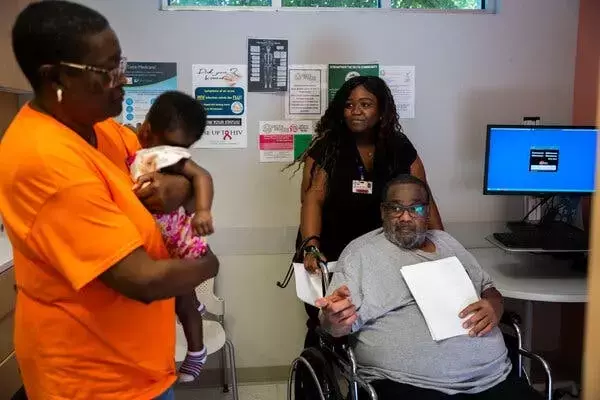




A Fragile Lifeline: How Policy Shifts Endanger Rural Healthcare Access
The Resilient Doctor and Her Community's Struggle for Care
Dr. Marketta Blue, a family physician at the Delta Health Center, embodies a vibrant spirit as she tends to her patients. This center, located in Mound Bayou, Mississippi, holds the distinction of being the nation's oldest federally funded rural community health facility. The town itself, founded in 1887 as an all-Black community, now sees over half its children living below the poverty line. In the past year, the center provided care to more than 14,000 individuals, with 36 percent relying on Medicaid for their health coverage.
The Personal Impact of Shifting Healthcare Policies
Dr. Blue's personal history, having grown up in the region with a grandmother who often postponed medical visits due to work and financial constraints, deeply informs her empathy for her patients. She understands the numerous obstacles they face in accessing care, from transportation costs and childcare issues to the loss of health insurance. A recent encounter with Johnie Williams, a 64-year-old patient, vividly illustrated these challenges. Mr. Williams, suffering from severe health issues, revealed that his Medicaid coverage had been terminated because his household income, when combined with his wife's, slightly exceeded the eligibility threshold, despite still having Medicare.
Nationwide Repercussions of Medicaid Reductions
The conversation between Dr. Blue and Mr. Williams foreshadows a broader crisis. Projections from the Congressional Budget Office indicate that changes in healthcare provisions, stemming from a domestic policy bill passed in July, will lead to an additional 10 million Americans losing health insurance by 2034. This bill also slashes federal Medicaid spending by over $1 trillion, marking the most significant reduction since the program's inception in 1965. Furthermore, starting in 2027, new work requirements will mandate proof of employment for Medicaid expansion recipients, potentially causing many to lose their coverage and face difficulties in re-enrollment, a concern widely shared by healthcare experts.
The Strain on Federally Qualified Health Centers
These policy changes are expected to burden the nation's 1,512 community health centers with an estimated $7.3 billion annually in uncompensated care costs, as they absorb the influx of newly uninsured patients. Supporters of the bill argue it will curb federal Medicaid expenditures, citing potential savings of $326 billion over a decade through the new work requirements. They claim it targets \"improper payments,\" thereby safeguarding Medicaid for those truly in need. However, Michael Cannon of the libertarian Cato Institute suggests that these policies primarily address fraud, implying that many who lose coverage are either ineligible or unwilling to navigate the certification process.
The Ripple Effect: Reduced Access and Funding Instability
Staff at the Delta Health Center are concerned that without Medicaid, patients will defer necessary treatments. Research from KFF, a health research group, shows that uninsured individuals are three times more likely to forgo essential medical care. Federally funded clinics, which often provide services on a sliding scale, face a potential surge in uninsured patients who may be turned away from other facilities. Gerard Anderson, a health policy professor, warns that these centers will be stretched even thinner, leading to a \"nightmare scenario.\" Compounding these stresses are federal funding freezes and cuts, such as the temporary suspension of a $250,000 Title X grant and a hold on a grant for women, infants, and children due to a government shutdown. Amy Simmons Farber of the National Association of Community Health Centers emphasizes the challenge of delivering services amidst such financial instability, noting the cumulative strain on these vital institutions.
Mound Bayou: A Historical Beacon Under Renewed Pressure
The historical context of Mound Bayou adds another layer to the narrative. Driving through the Mississippi Delta, past fields and towns steeped in blues history, one arrives at Mound Bayou, a town that once flourished during the Jim Crow era with its own bank, train station, and newspaper. The mechanization of farming and subsequent job losses led to the decline of many local businesses, including the town's sole grocery store. Today, it stands as a small community with a median household income just over $23,000 annually. The Delta Health Center itself was founded by civil rights activists in the 1960s to address the systemic denial of healthcare to Black patients and even white civil rights workers in segregated hospitals. The center faced opposition from its inception, with local newspapers questioning the need for a federally funded clinic.
A Safety Net Under Siege: The Future of Rural Healthcare
Over the past two decades, the Delta Health Center expanded its reach, establishing 17 satellite clinics and deploying mobile treatment vans. However, this progress is now at risk. John Fairman, the center's chief executive, fears a potential retrenchment, possibly leading to the closure of some outlying clinics. He underscores the center's critical role: \"We are the safety net here.\" This sentiment was echoed by Tracy Price, a 66-year-old patient who brought her 19-year-old granddaughter, suffering from bipolar disorder and lacking medication due to lost insurance, to the clinic. Ms. Price's desperate plea for help highlighted the immediate and severe consequences of fragmented healthcare access.
Dr. Blue's Unwavering Commitment
Despite a packed schedule, Dr. Blue maintained her cheerful demeanor, sharing jokes with each patient. She listened attentively to Wesley Tribune, a 68-year-old diabetic, who humorously described his wife's efforts to curb his intake of unhealthy foods. Later, she addressed Mr. Williams' anxieties about affording future medical care. When he mentioned potentially skipping appointments to save money, Dr. Blue firmly advised against it, insisting on necessary tests. Her concern briefly gave way to joy when she saw his hemoglobin A1c level, a measure of blood sugar, had significantly improved. Turning to Ms. Williams, Dr. Blue reassuringly declared, \"He's going to be OK!\" This moment encapsulated her deep dedication and the profound impact of her work in a community grappling with evolving healthcare challenges.
